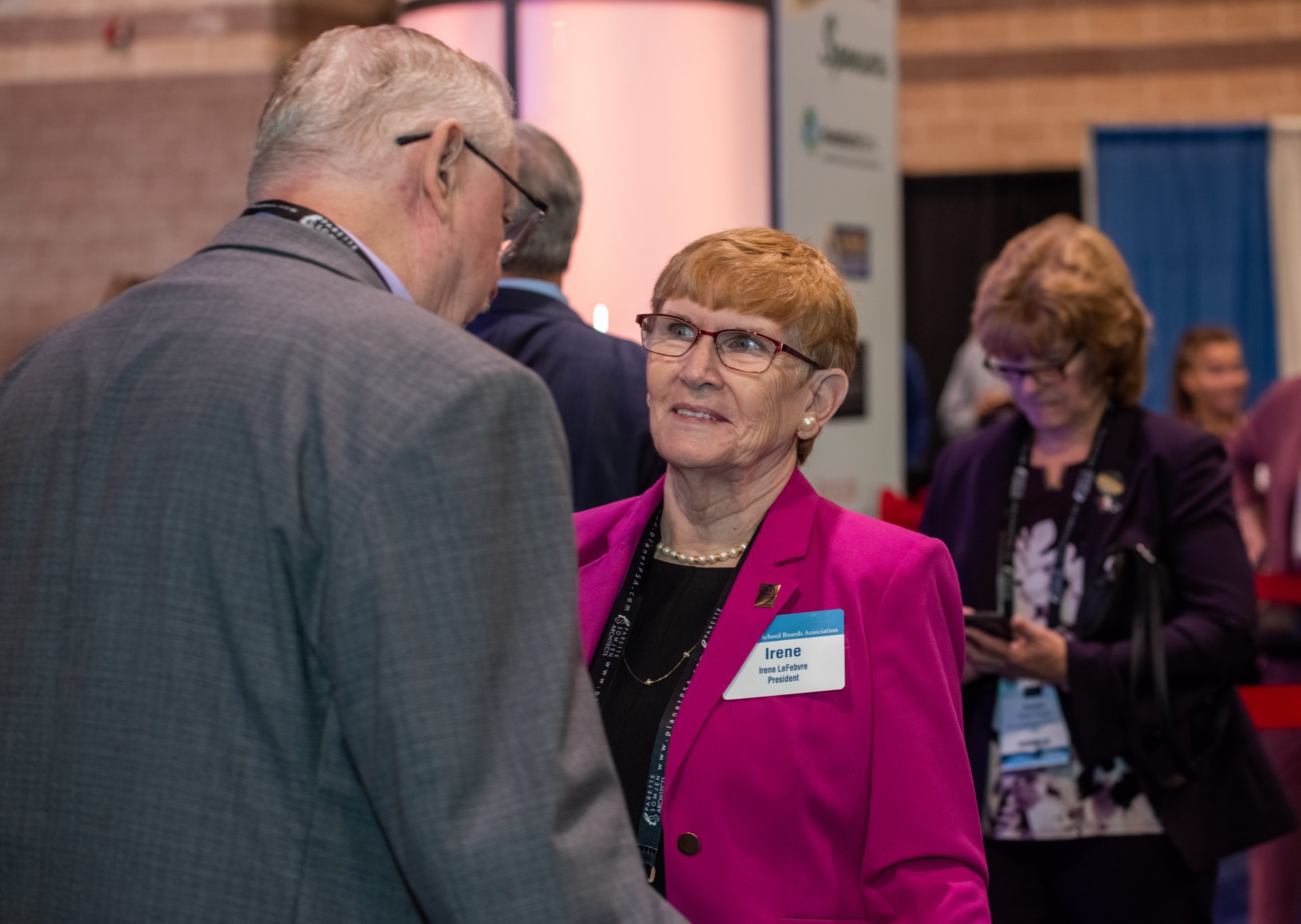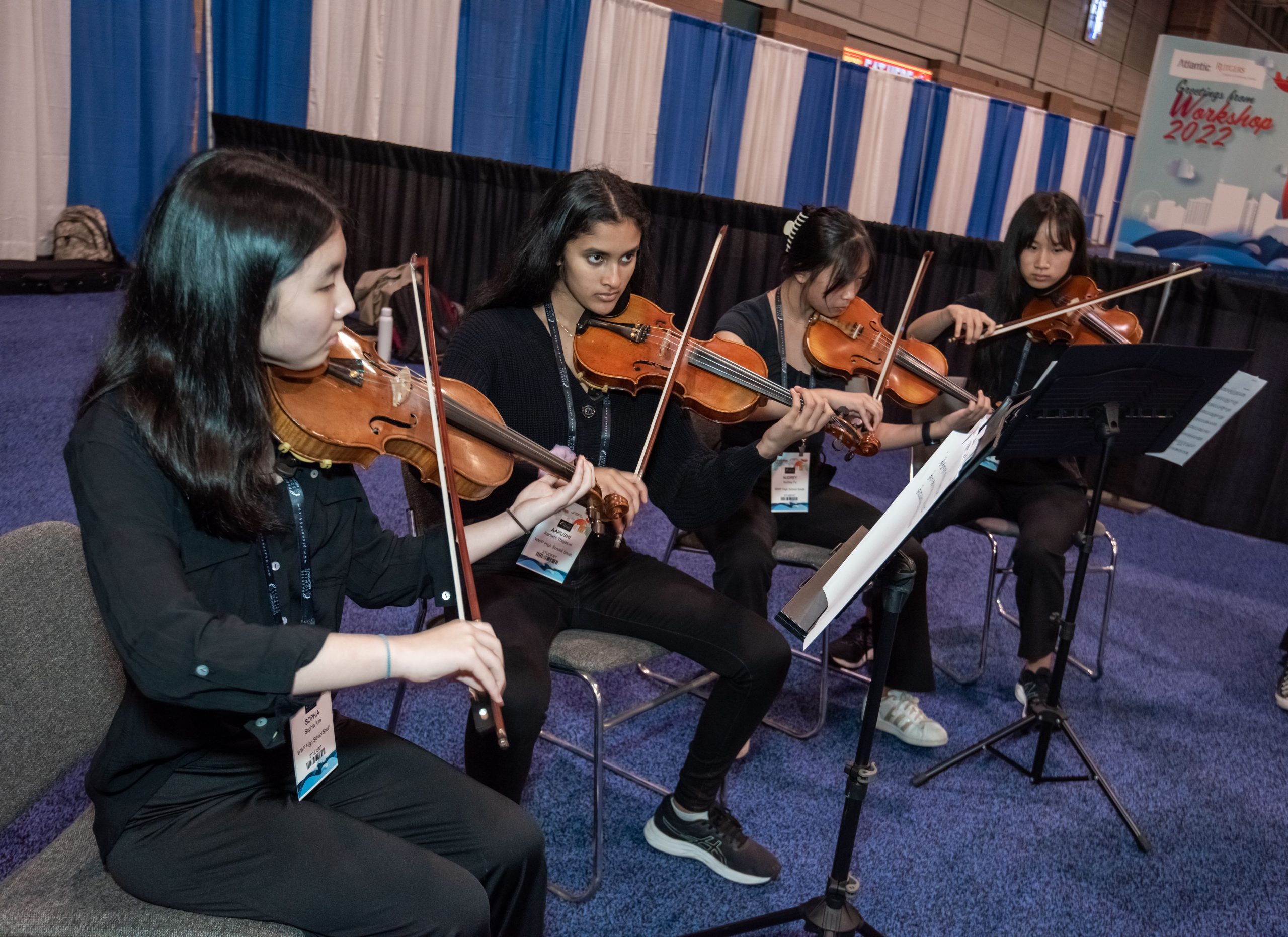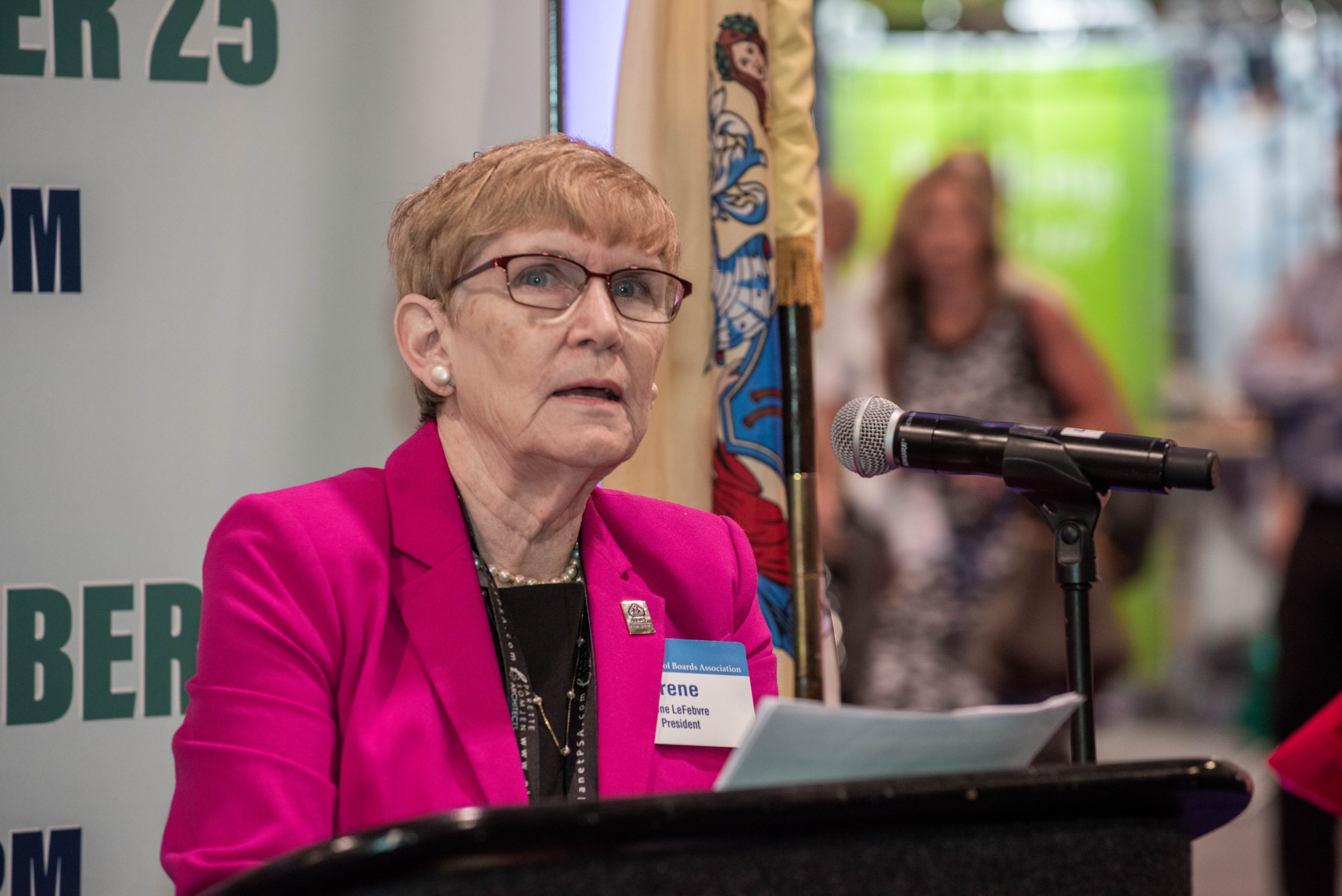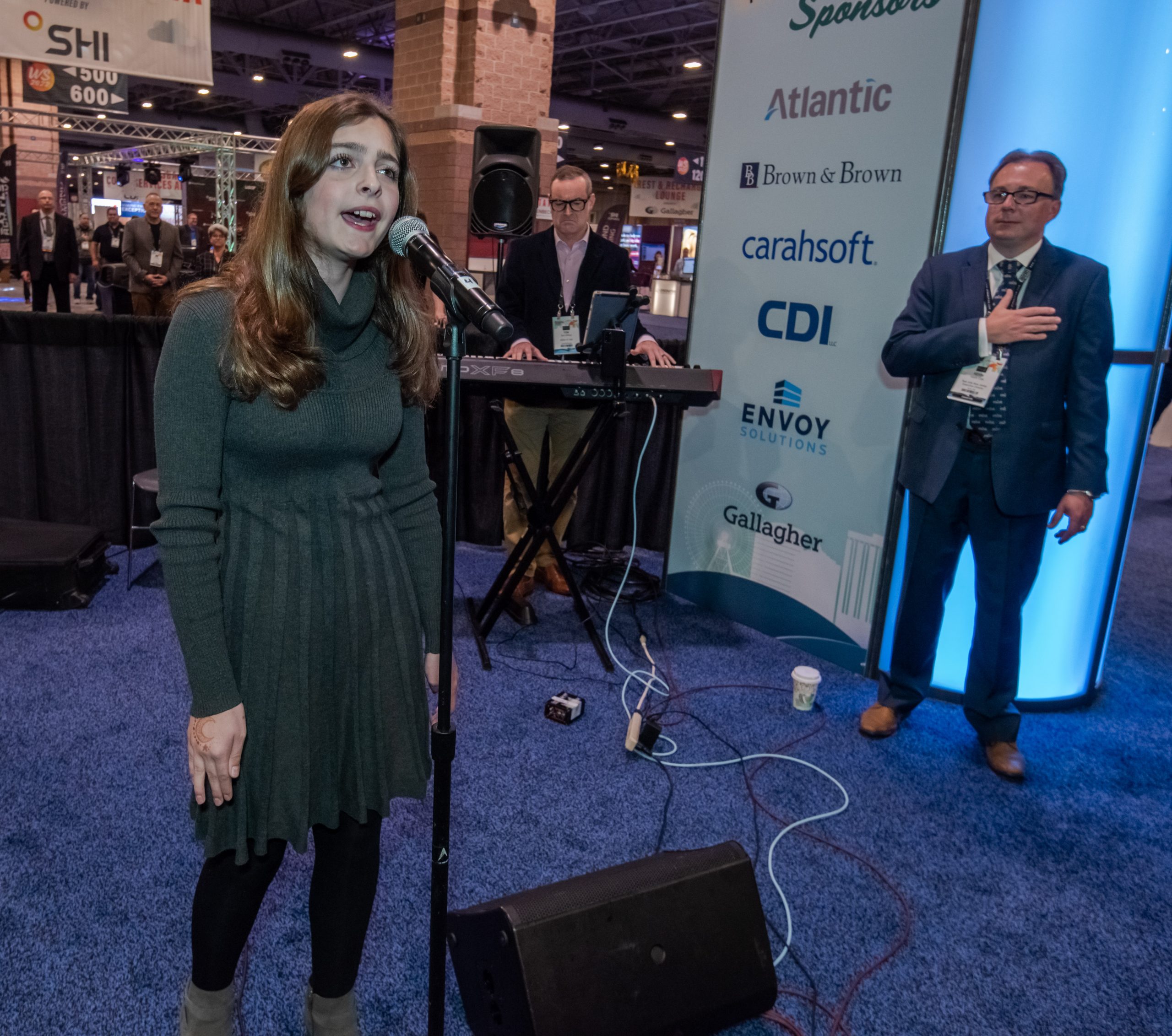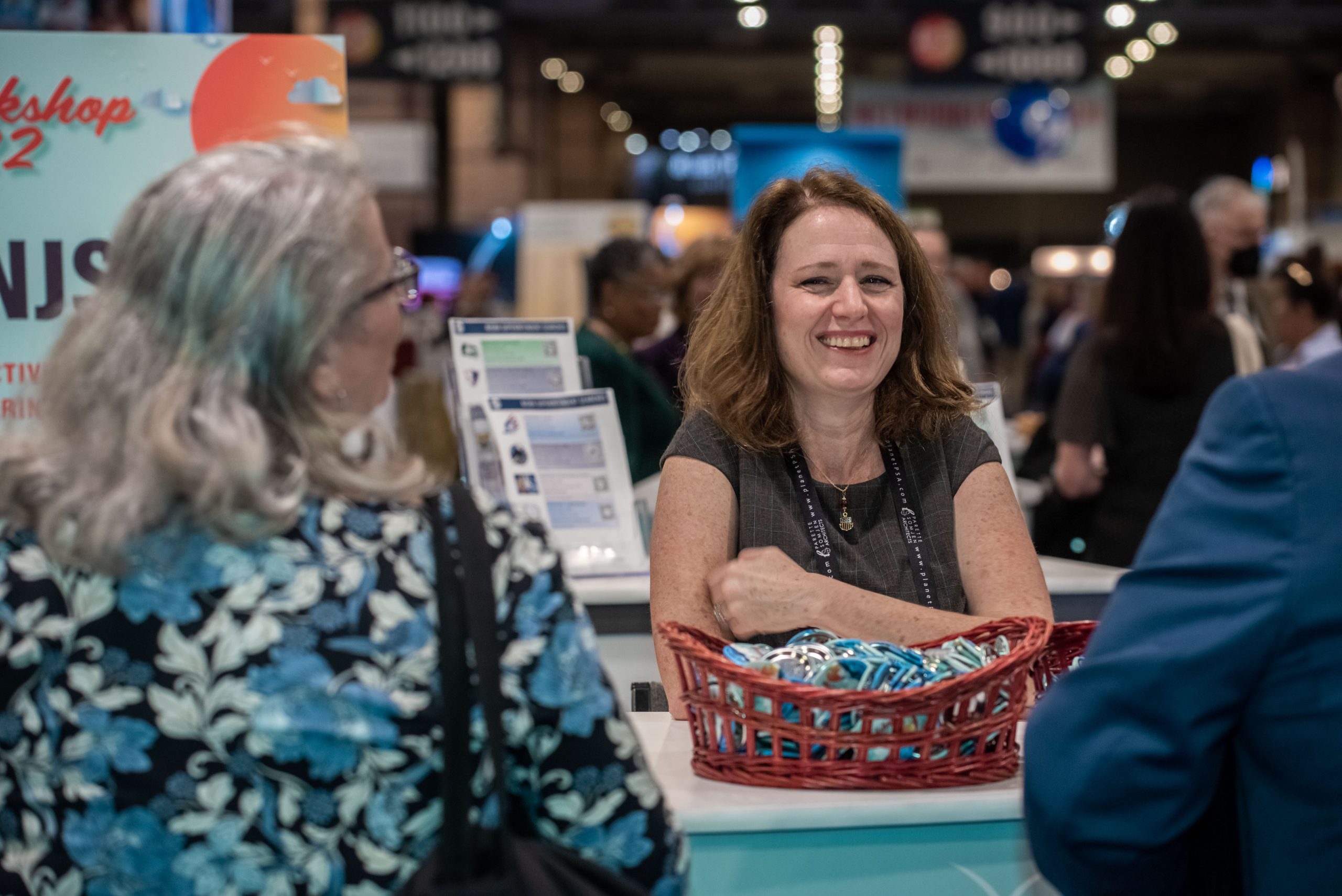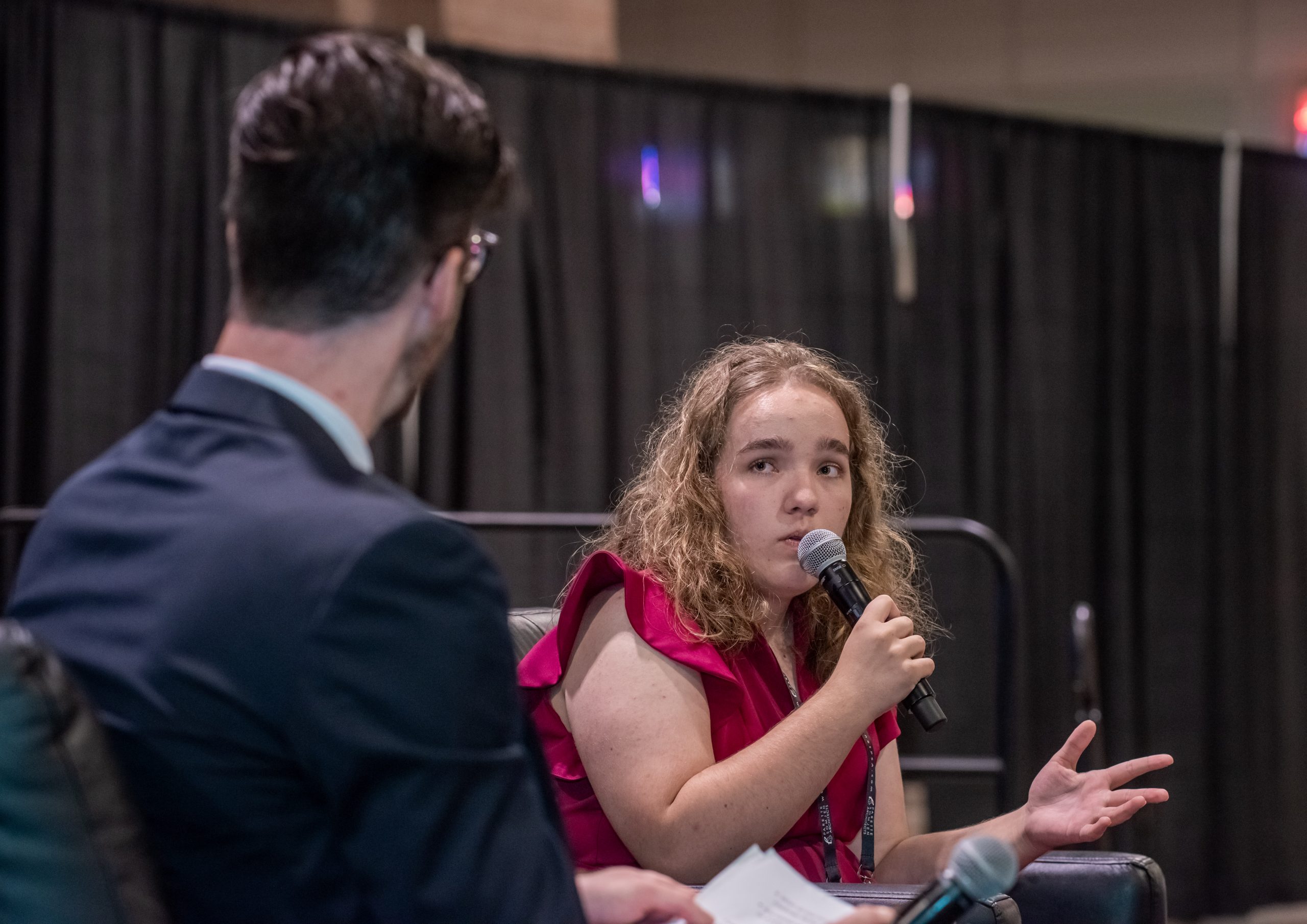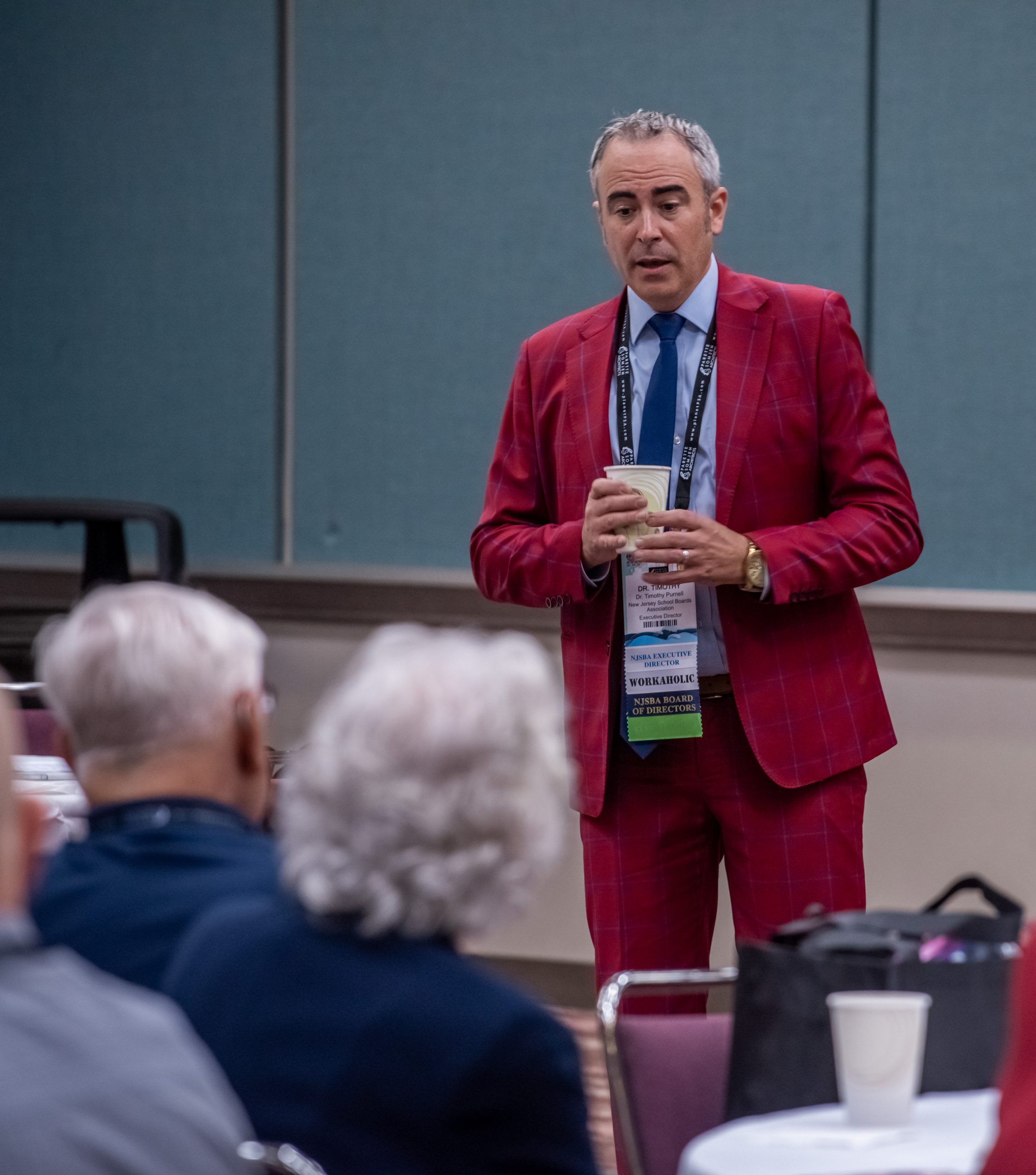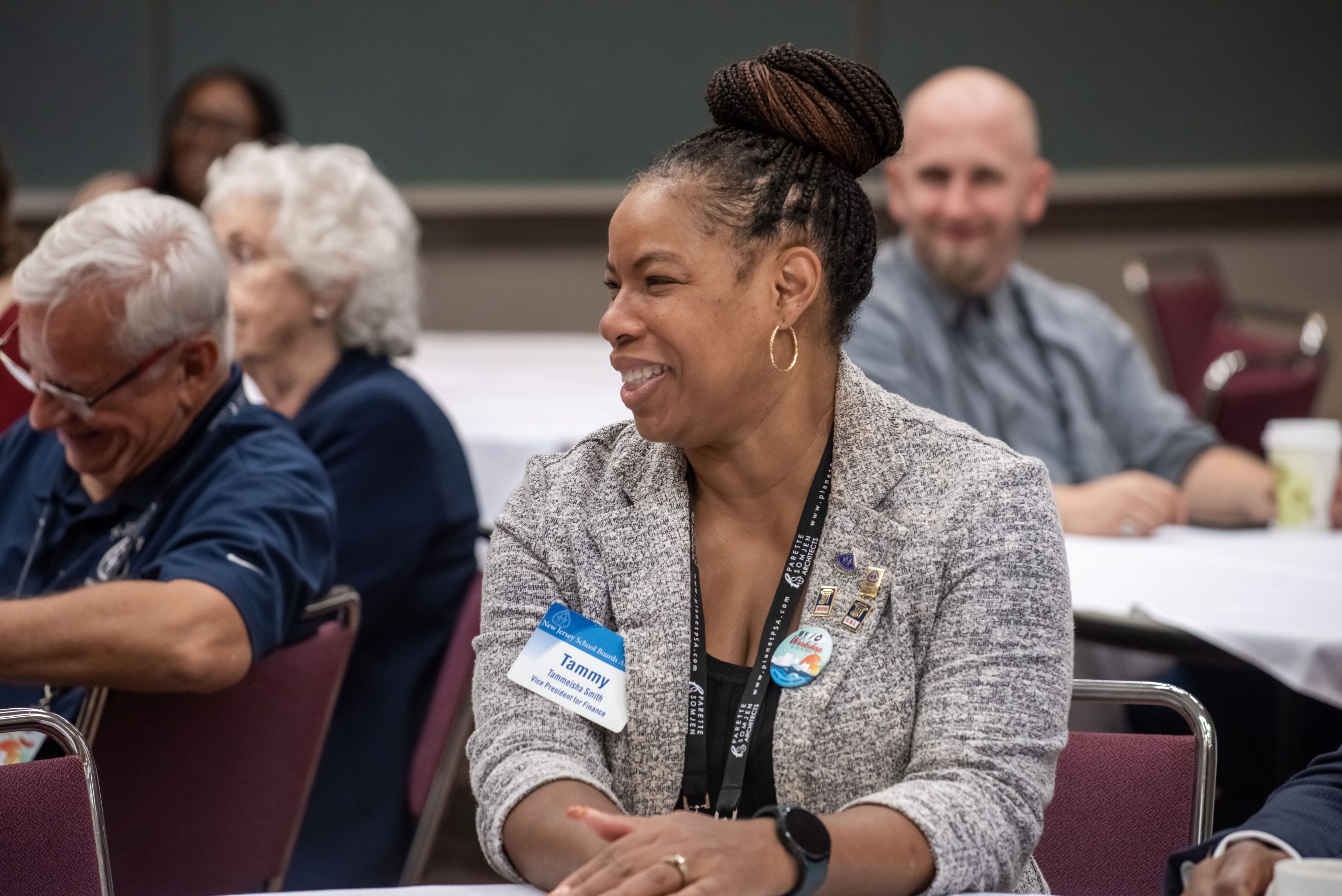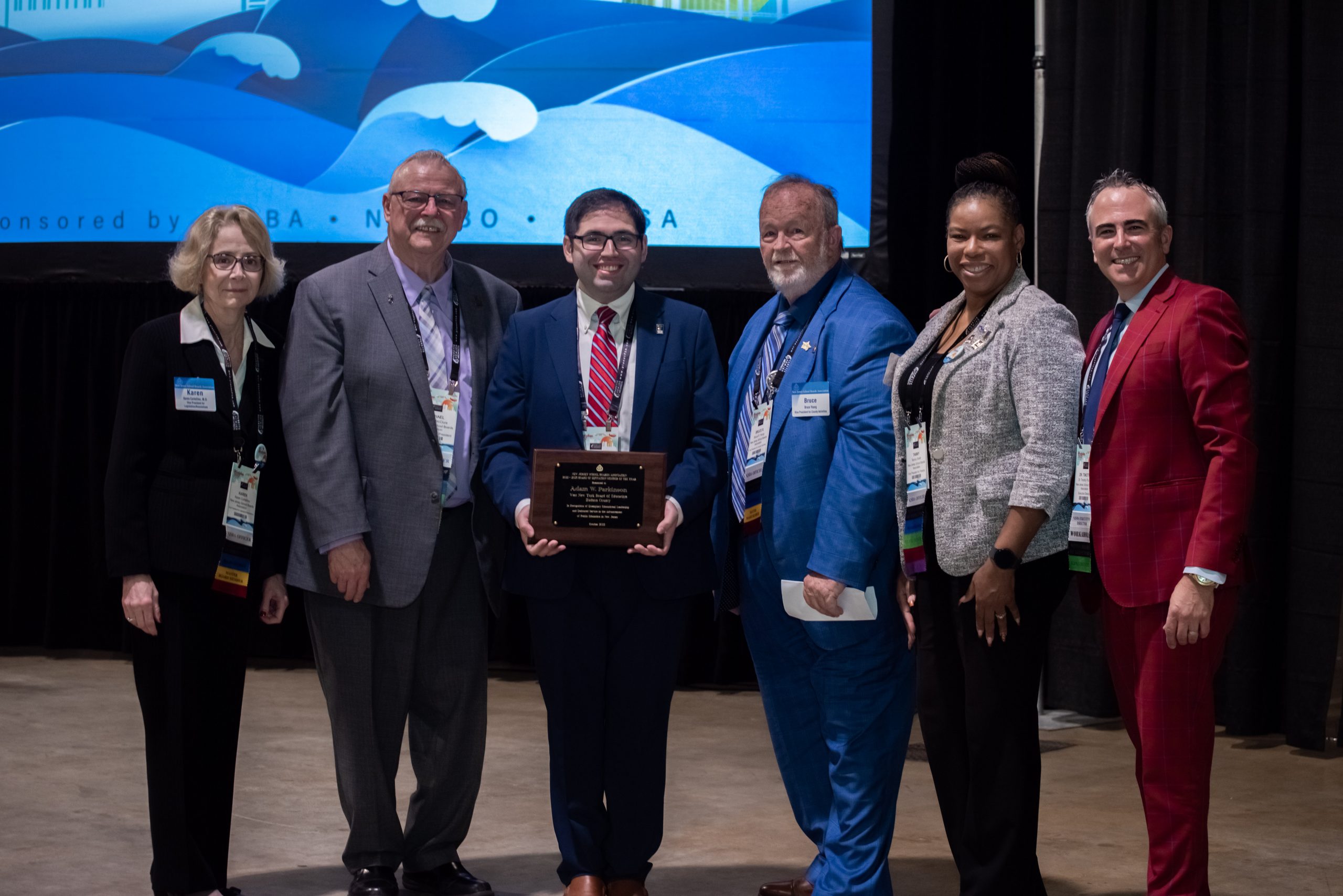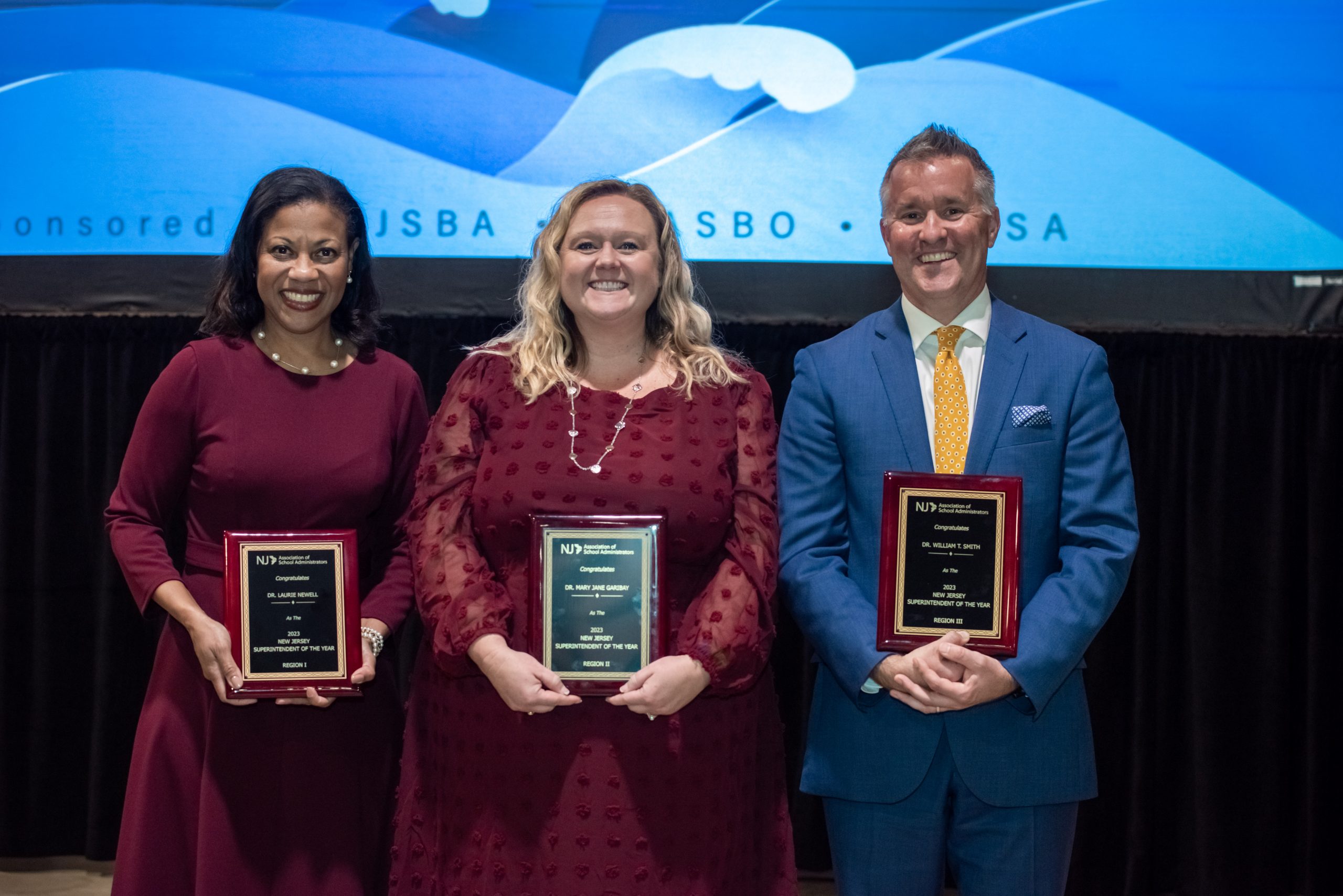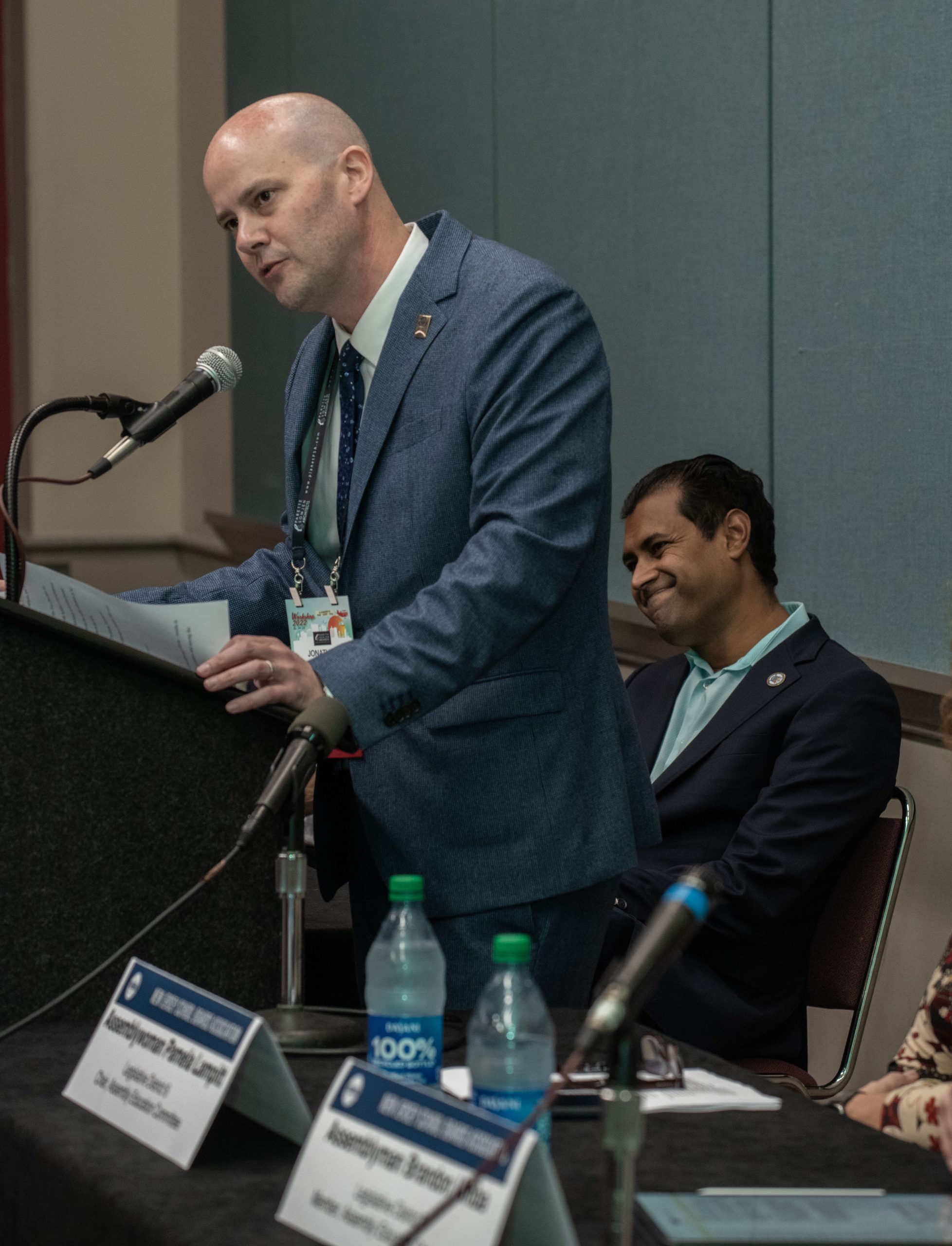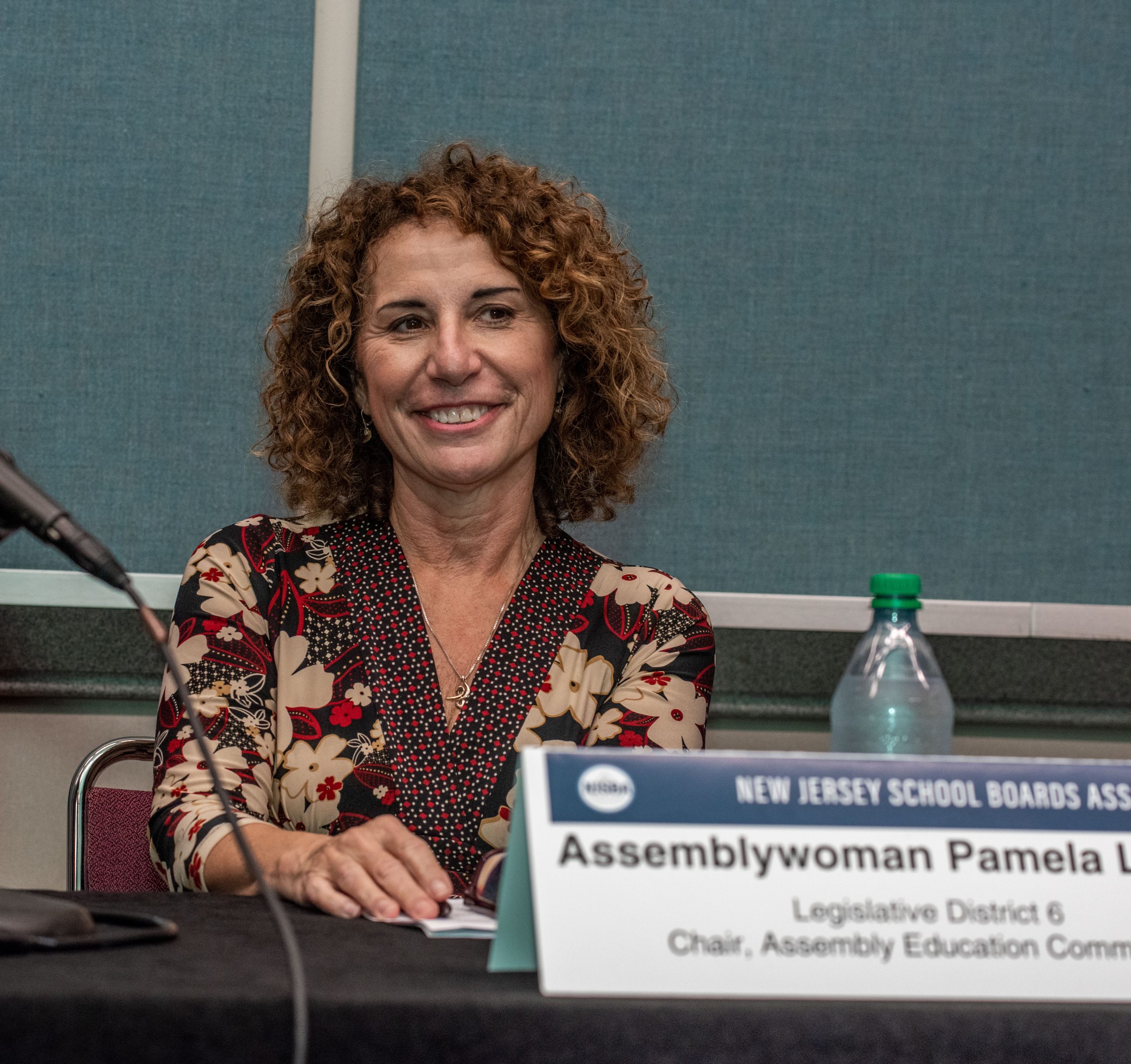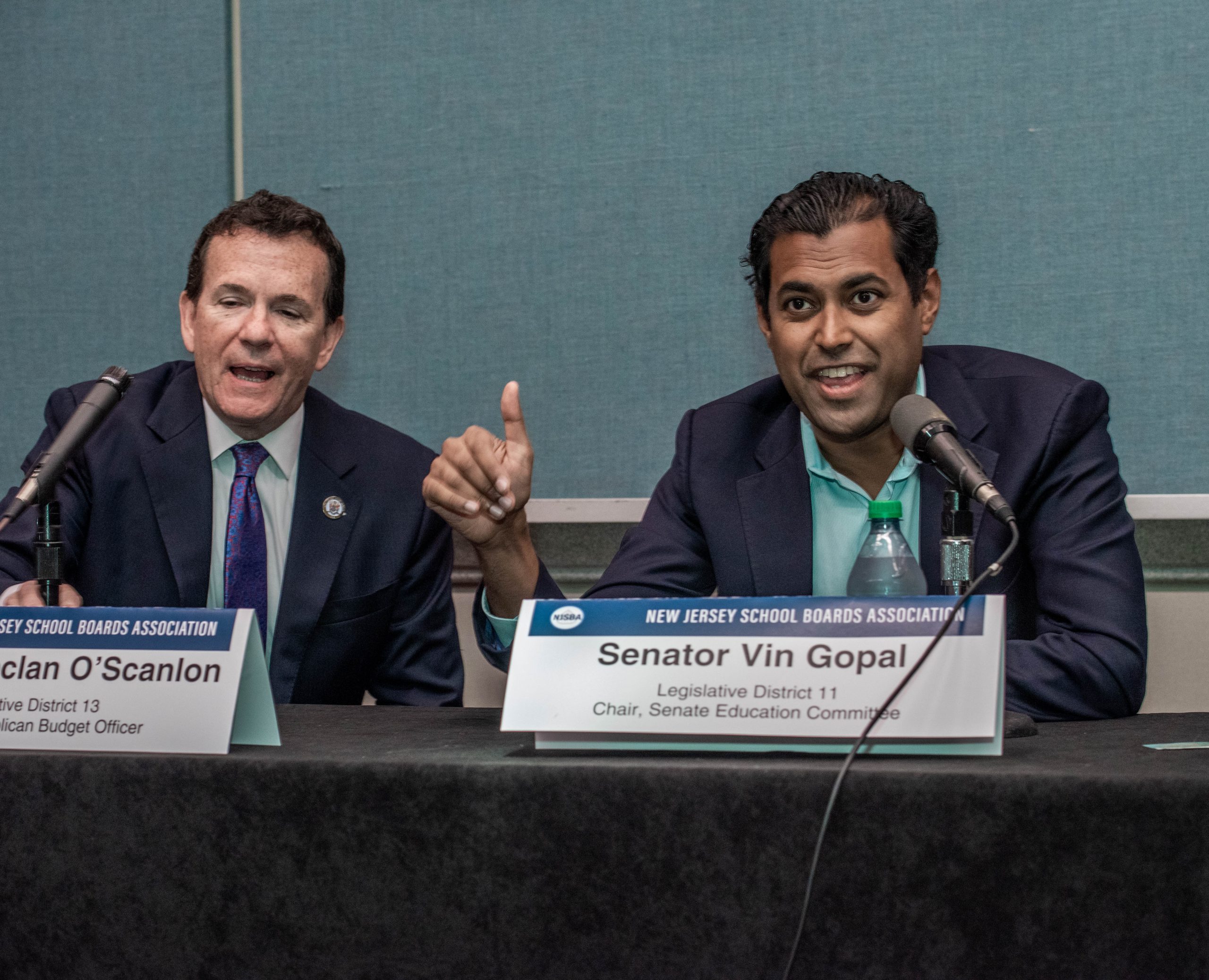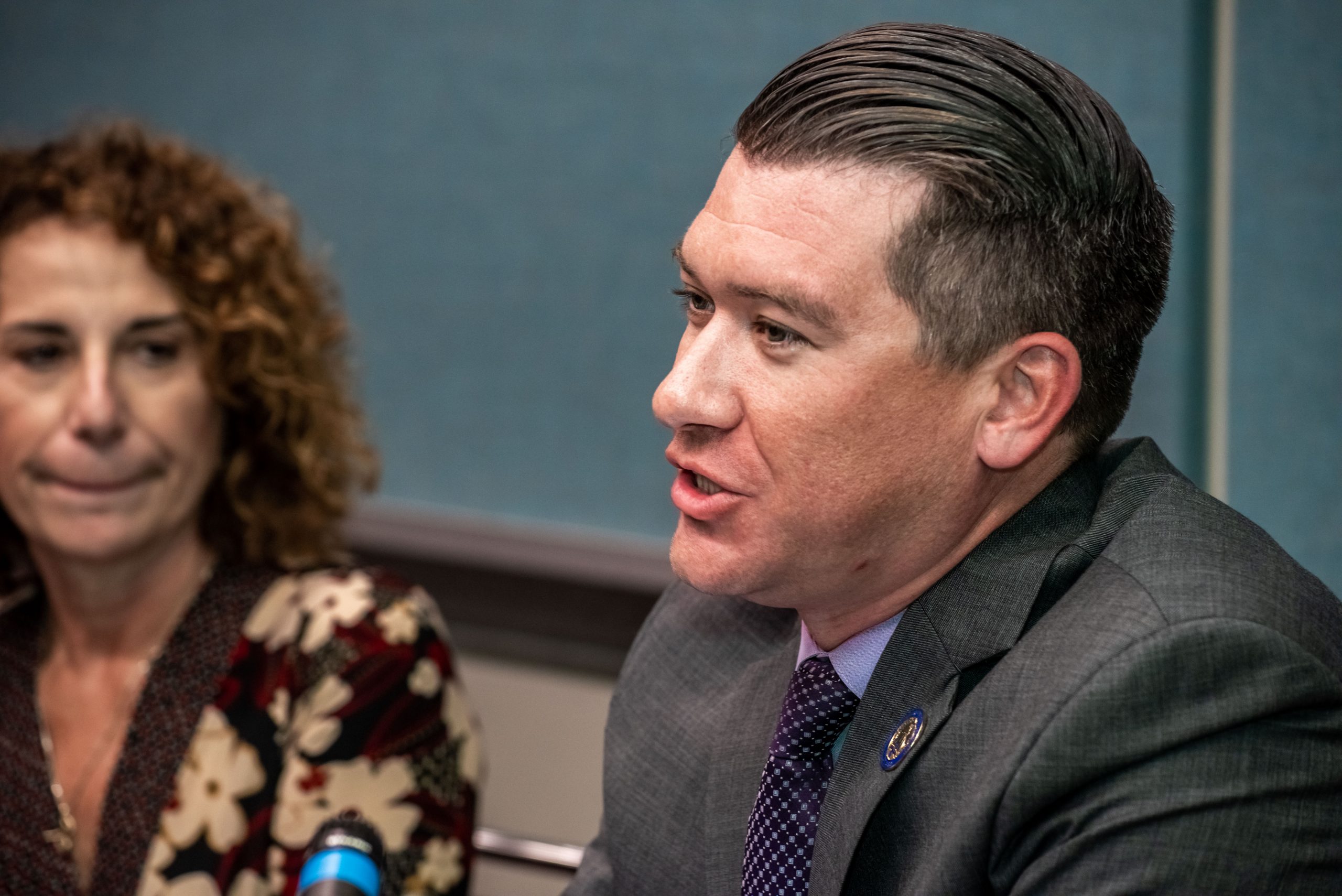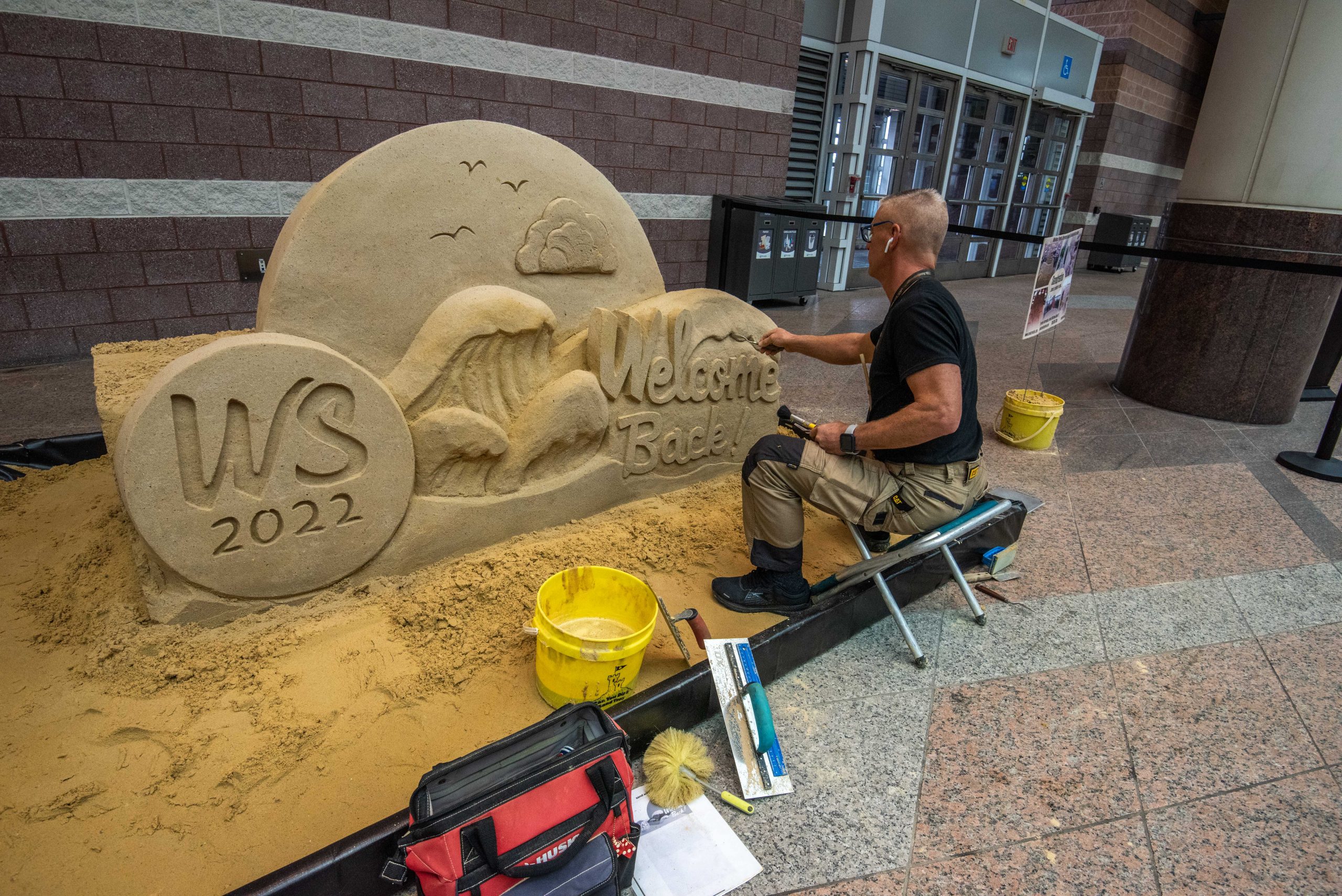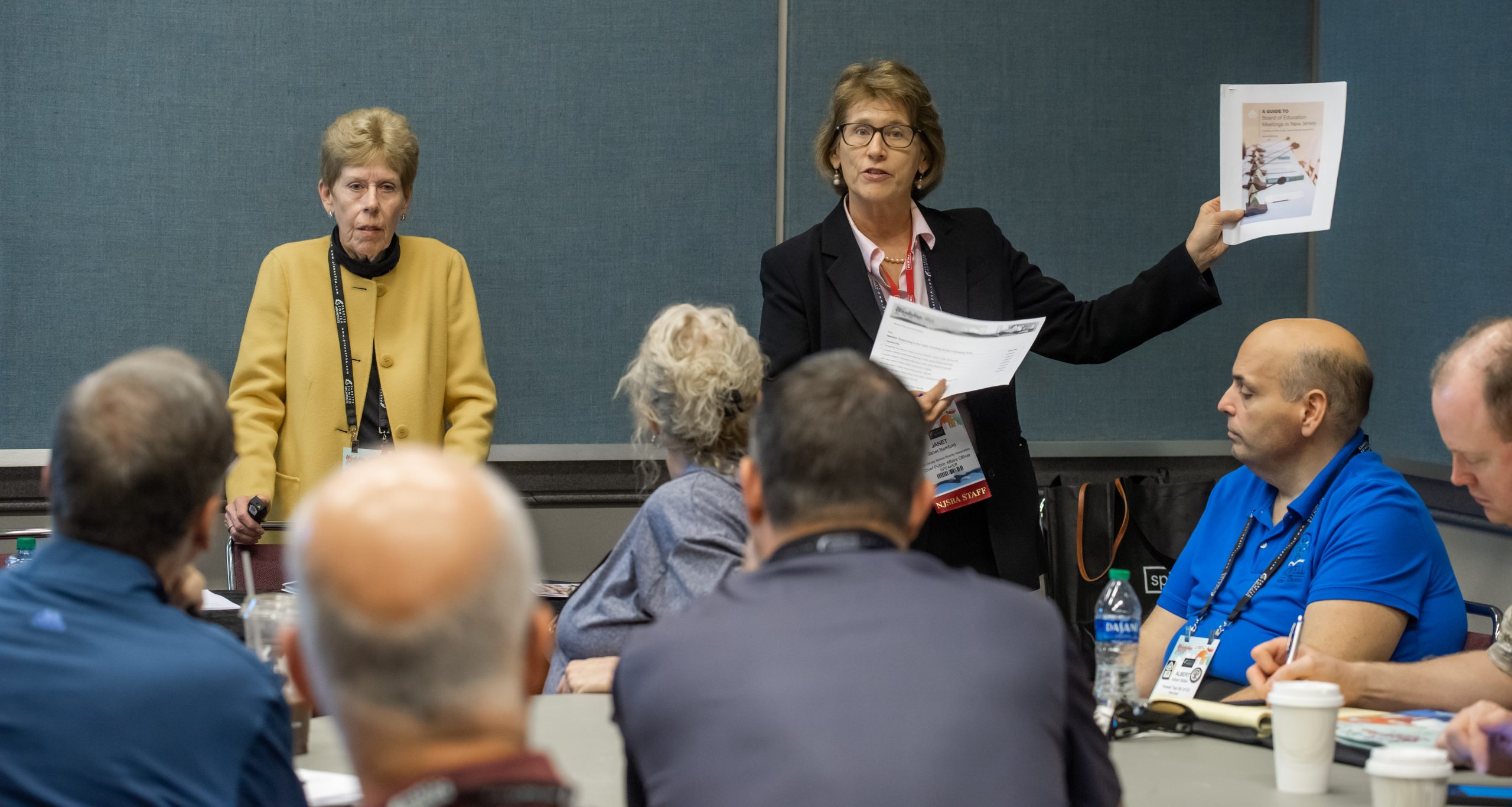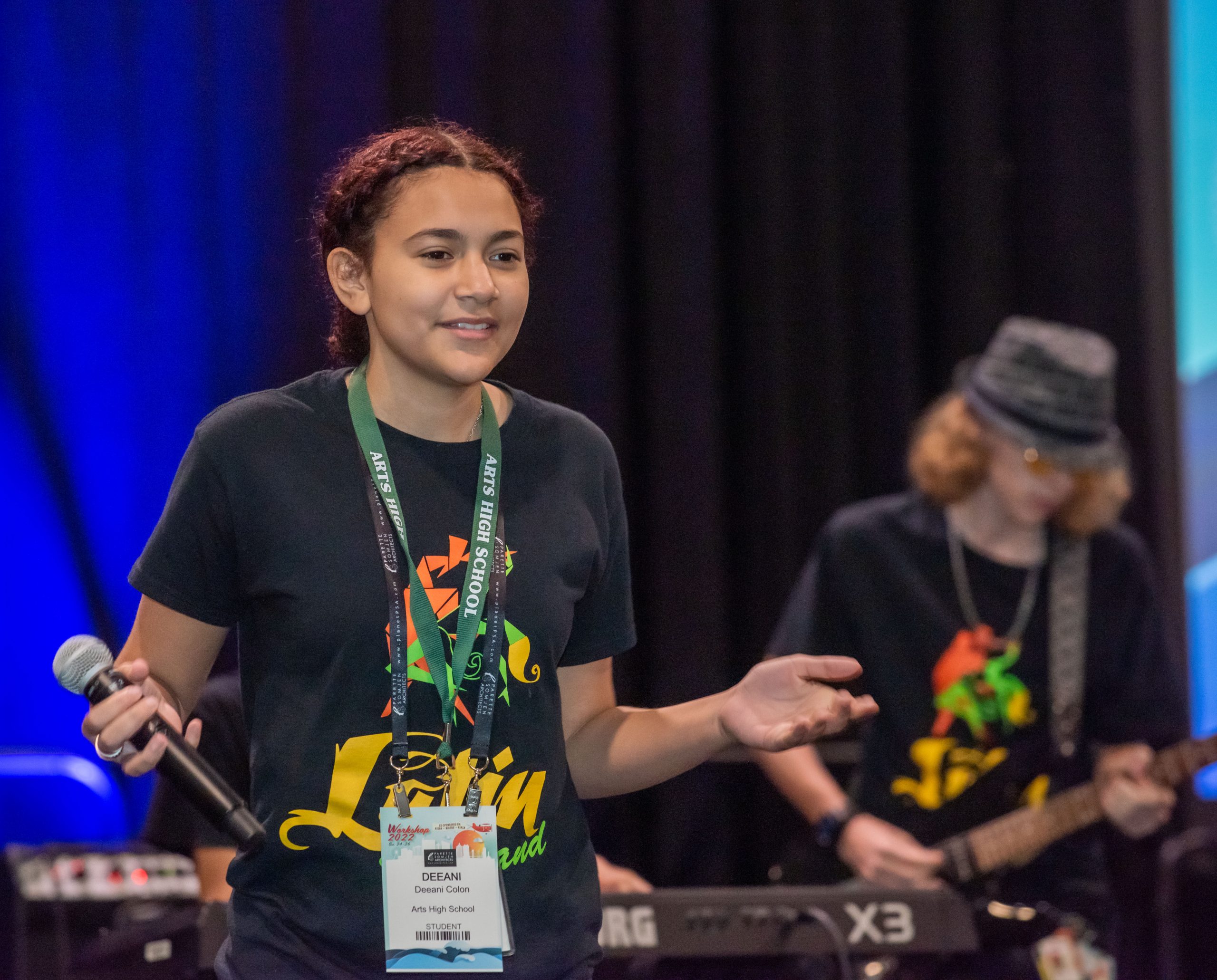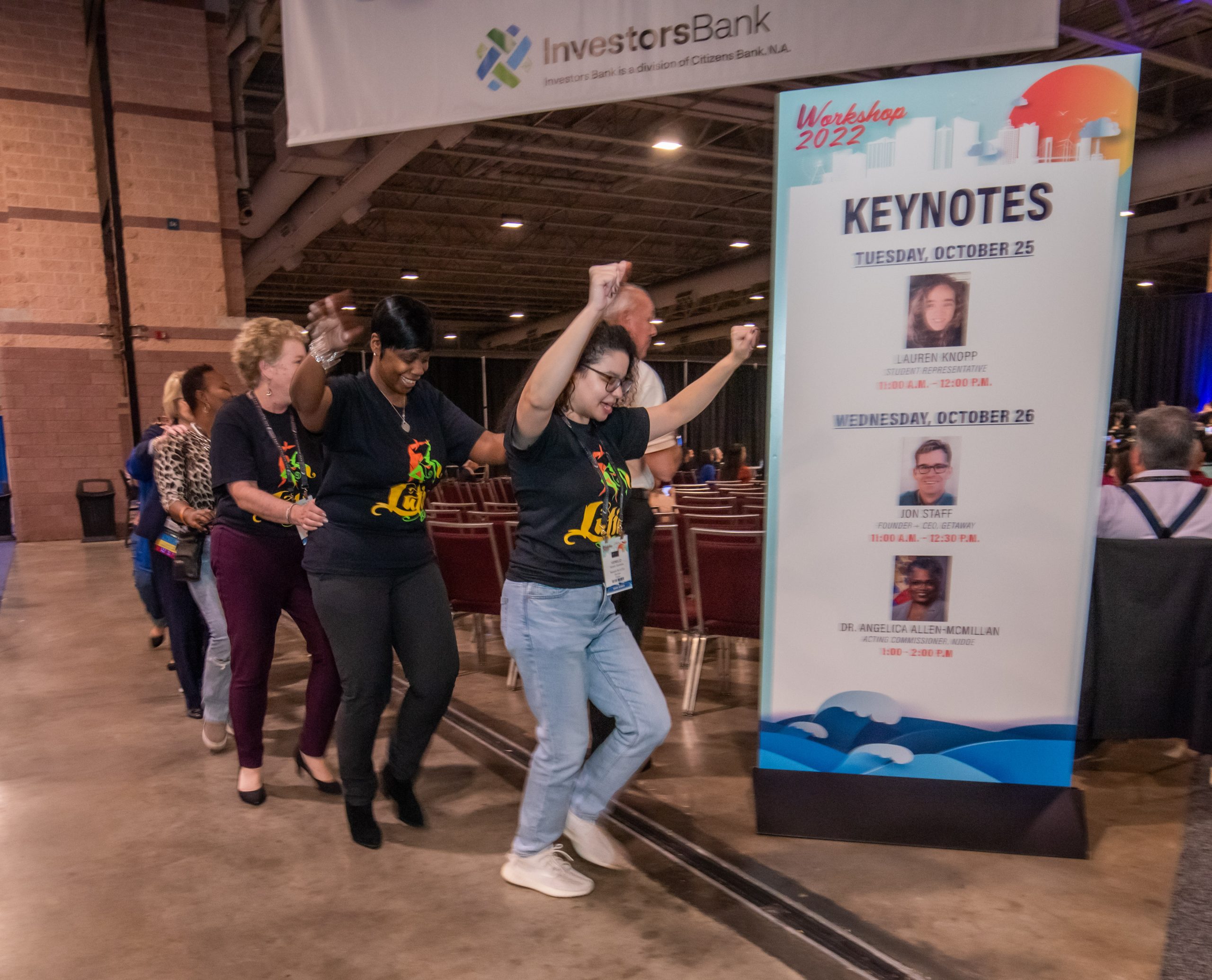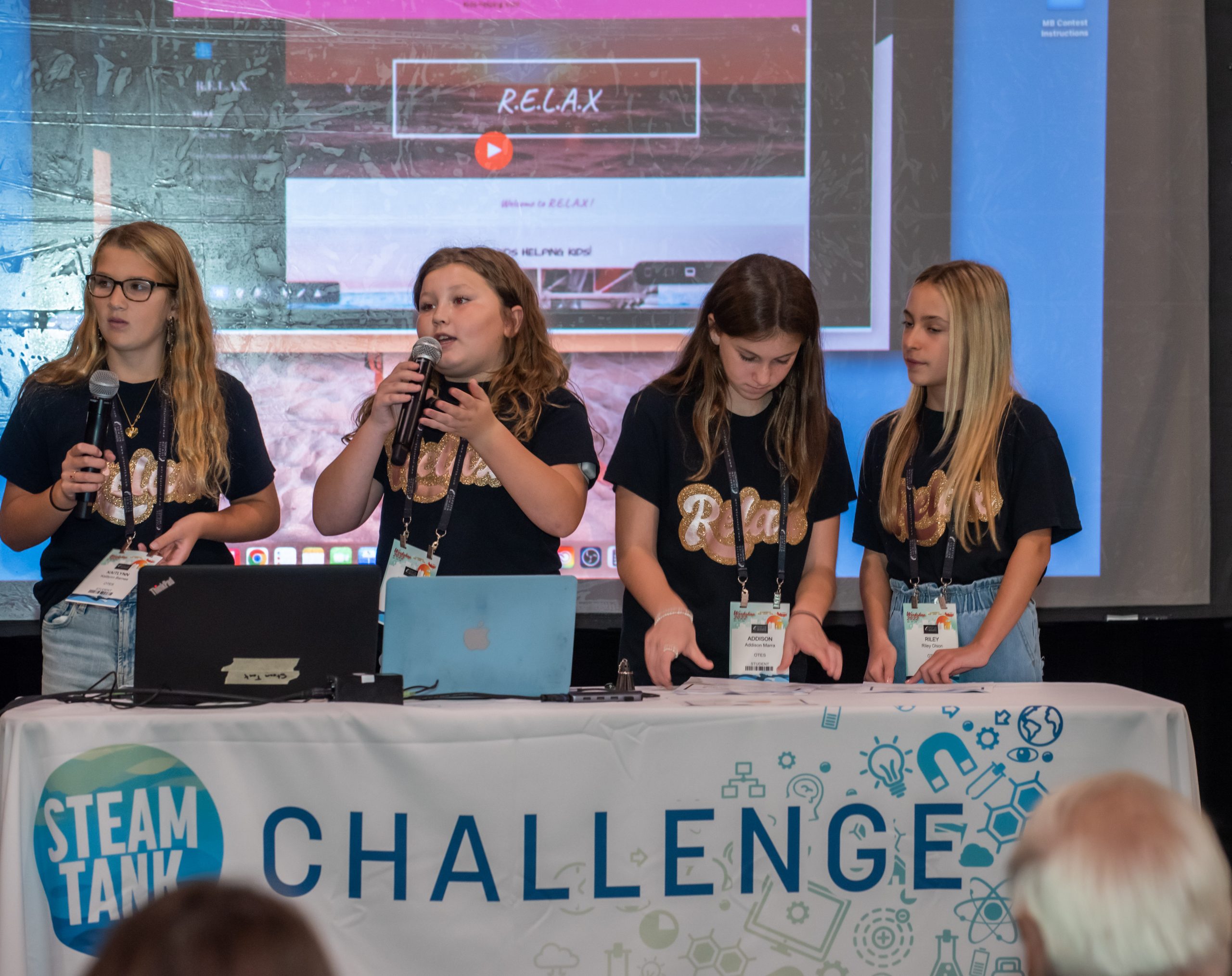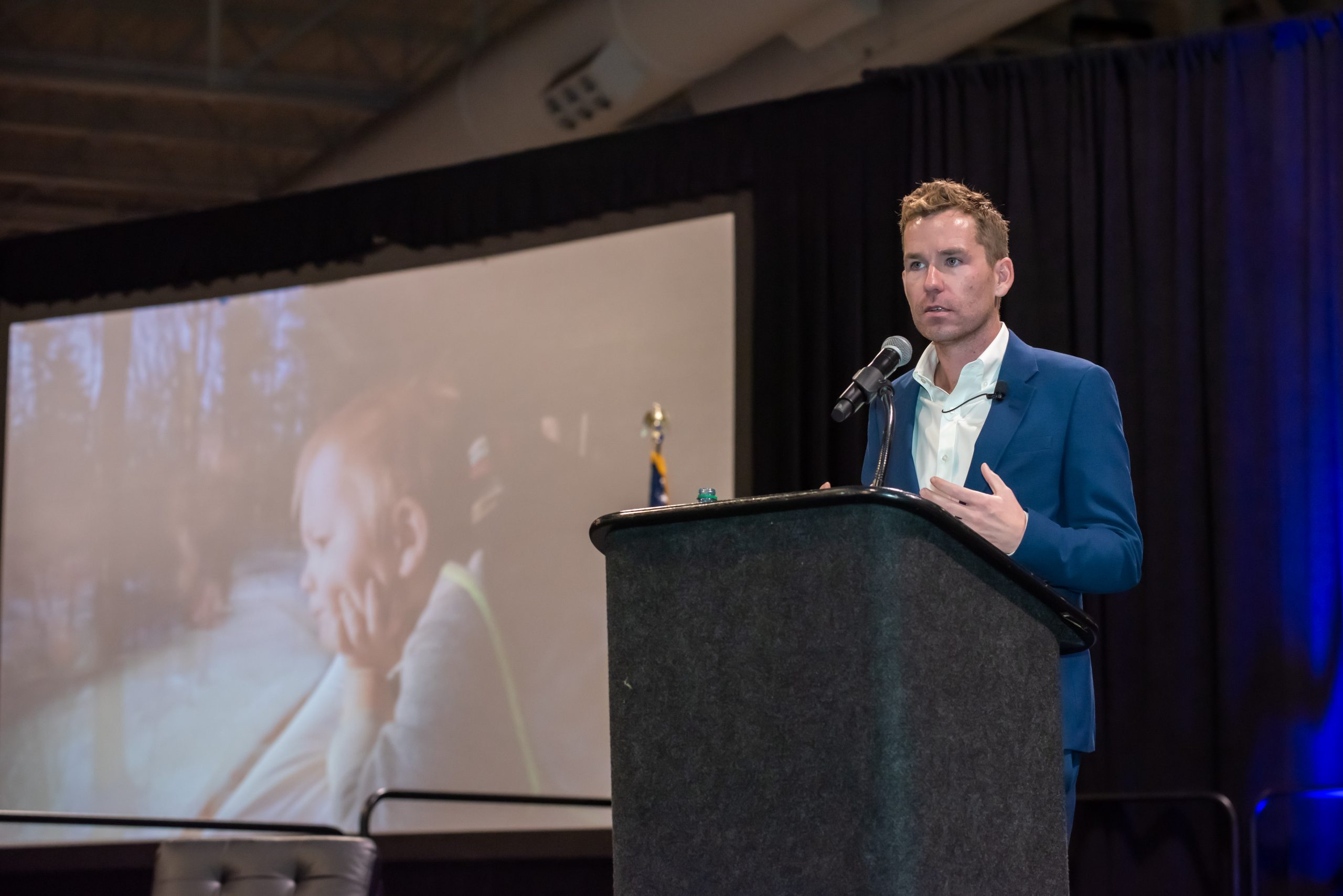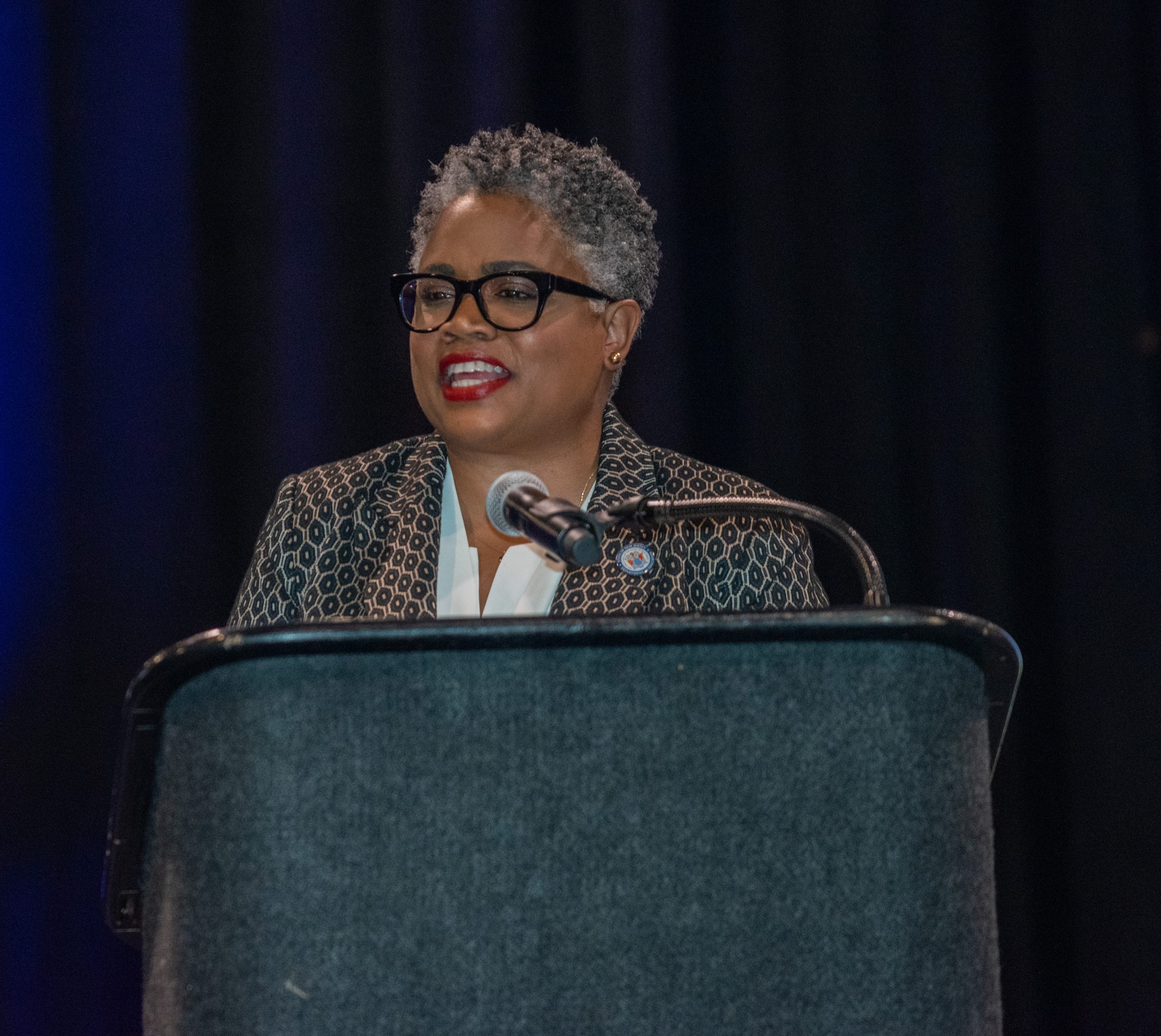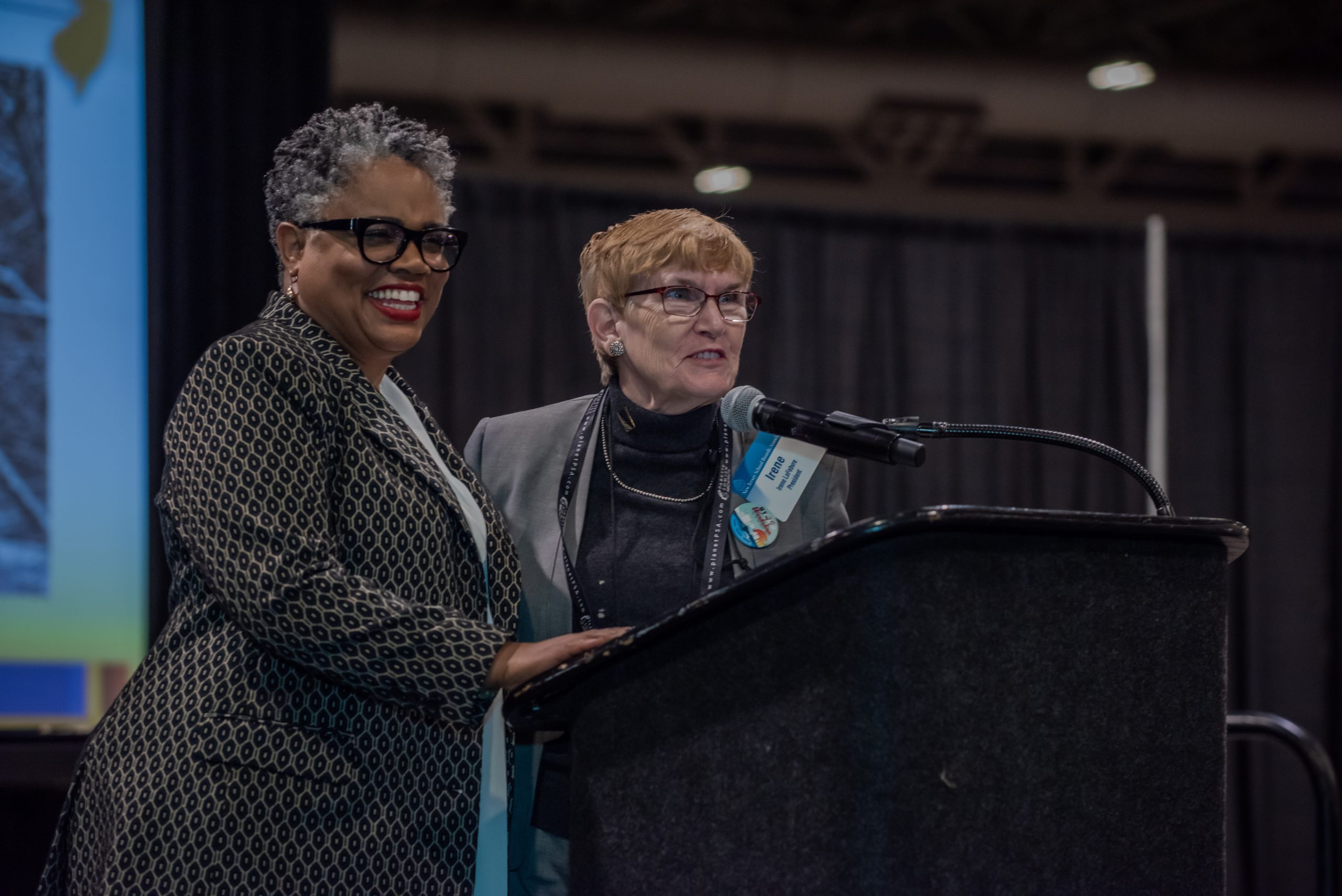Some 6,000 local school officials gathered at Workshop 2022, Oct. 24-26 at the Atlantic City Convention Center, marking the first time the event has been held in person in three years as a result of the COVID-19 pandemic.
The largest training conference for New Jersey’s public school leaders, which is jointly sponsored by the New Jersey School Boards Association, the New Jersey Association of School Administrators and the New Jersey Association of School Business Officials, offered more than 275 training and information sessions and the chance to connect with more than 350 exhibitors.
“Most local boards of education, teachers, school administrators and other leaders in education never imagined they would have to close schools and teach students on a virtual basis while navigating a pandemic,” said Dr. Timothy Purnell, executive director of the New Jersey School Boards Association. “We are so thankful to be meeting again in person as we work to advance the achievement of all students and promote the efficient operation of school districts.”
While the exhibit floor did not open until Tuesday, the first day provided plenty of excitement, with new board members and others participating in board governance training and school leaders from throughout the state attending Patrick Dunning’s keynote presentation showcasing The Signature Project.
At The Signature Project’s core is a huge 76-foot-by-36-foot mural, which will be comprised of 171 canvases layered with hidden secrets. The project was conceived in 1992, with Dunning seeking to create a new artform: a human tapestry that could be completed only by collaborating with over one million people.
Opening the Exhibit Floor
Irene LeFebvre, president of NJSBA, addressed attendees Tuesday morning before the ribbon-cutting ceremony that marked the opening of the exhibit floor.
Surrounded by NJSBA, NJASA and NJASBO officers and a large crowd, she thanked attendees for turning out to the convention so they could share ideas, celebrate successes and focus on advancing the achievement of all students.
She also introduced the Association’s executive director, Dr. Timothy Purnell, who was attending his first Workshop at the helm, dressed in a sharp red suit to match the red ribbon that was cut to allow people onto the floor.
“Dr. Purnell’s commitment to New Jersey students and educators runs deep,” LeFebvre said, before asking the crowd to give him a warm welcome.
Purnell introduced NJSBA’s leadership team as well as the leadership teams at NJASA and NJASBO. Emerson Granata, a 12-year-old student in the Holmdel School District, sang the National Anthem.
Later in the day, Dr. Karen Cortellino, NJSBA’s vice president for legislation/resolutions, introduced one of Workshop’s keynote speakers, Lauren Knopp, a senior at Ocean City High School in Cape May County, who serves as the student representative on the New Jersey State Board of Education.
Knopp focused on how the pandemic has affected students, teachers and administrators, noting that even after two years “it is still so difficult to comprehend the magnitude of the pandemic.”
She highlighted how the pandemic affected the landscape of learning, including the mental health issues it has caused students. “The increase in behavioral mental health issues had a huge impact on the entire school population,” she said.
Even though leaders united to strive to ensure students, teachers and administrators do not feel alone, Knopp said students are still struggling. She noted that at her school, student council meetings before the pandemic were often packed, but now there is less engagement at these meetings and other events. She urged school leaders to identify barriers that may prevent students from participating in activities – and then remove them.
Legislators Tackle Big Issues
Also on Tuesday, Jonathan Pushman, NJSBA’s director of governmental relations, moderated a panel discussion co-hosted by the Garden State Coalition of Schools with legislators.
Panelists included Sen. Vin Gopal (D-11) – chair, Senate Education Committee; Sen. Declan O’Scanlon (R-13) – Senate Republican budget officer; Assemblywoman Pamela Lampitt (D-6) – chair, Assembly Education Committee; and Assemblyman Brandon Umba (R-8) – member, Assembly Education Committee.
The teacher shortage is a focal point for Gopal, who observed that some members of the public are coming to board meetings and accusing teachers of horrific things without any proof. Talk of placing cameras in classrooms is “going down a dangerous path,” he said.
One of the challenges of attracting people into the teaching profession is that the starting salary is often in the 50s, “which is OK, but over 30 years you are lucky if you ever hit six figures,” he said.
Later, Umba said he would support lifting the state residency requirement for teachers, which received a round of applause. “Bring them into New Jersey if they are ready and willing,” he said.
Lampitt mentioned the idea of compensating students for student teaching. “They have to take a year off and pay tuition to school and then not be paid …. how can they afford it?” she asked
O’Scanlon highlighted a number of challenges schools are facing, including controversy surrounding the School Based Youth Services Initiative and inflation. Fiscally, the state is not facing a ticking time bomb but “a slowly exploding time bomb,” he said.
The “continuity of education” is important, Lampitt said. Even after students move on to higher education, it’s important to encourage young people to “stay in New Jersey and find purpose and meaning to be able to stay here,” she said.
She received a hearty round of applause when she said, “I don’t want to mandate more – I want to mandate less.” She added, “The more we can take off of your plate, the more time you can spend in the classroom and spend with your teachers and spend with your school board and all the liaisons you need to work together to be able to do what you need to do.”
Umba, one of the newer members on the Assembly Education Committee, said he wanted to serve on the committee since as the business administrator for Manchester Township in Ocean County, he sees the struggles the town is facing as it’s gaining students. He also noted that his sister-in-law works in special education, and so he’s familiar with the challenges districts face in that area. His areas of focus have evolved as he’s gotten to know more about the challenges schools face, he said.
One area that he’s concerned with is the frequency with which schools are testing students. Often, school counselors must focus on being test proctors instead of meeting and helping students “because so many assessments are coming out,” he said.
The state needs to take a “strong look” at how it’s funding school districts, Umba said.
The legislators also tackled learning loss, with Lampitt noting that learning acceleration is a tool that can help improve outcomes for students.
Tutoring is one of the best ways that could help young people, she said. “To think we are going to get them back up to speed in a universal way without individualized support is just not going to happen,” she said.
Gopal agreed tutoring could help, noting that he’s the primary sponsor of S-3220, which would establish a state tutoring advisory commission within the state Department of Labor and Workforce Development and an accompanying “High Efficiency Accelerated Learning Grant” to fund tutoring programs in New Jersey schools. “The research overwhelmingly shows accelerated learning programs are the most effective tool for mitigating learning loss,” he said.
Woven into the issue of learning loss are the mental health challenges that students face, Gopal added. He highlighted depression and anxiety, which keep going up among students.
Echoing the concerns of some of her colleagues, Lampitt decried the inclination to engage in so many assessments, singling out the Start Strong assessment conducted earlier this year, which the NJSBA urged the New Jersey Department of Education to rethink. “We went into this year testing and assessing — and utilizing that time in that manner takes us a couple steps backward in terms of getting our young people to where they need to be,” she said.
One of the hottest topics was the Department of Children and Families’ recent proposal to establish the New Jersey Statewide Student Support Service Network, a student mental health initiative. The NJSBA has urged the Murphy administration to preserve the existing School Based Youth Services Program, while increasing investments in programs and services that will enhance student mental health. You can find the Association’s written comments that it submitted Oct. 14 here.
O’Scanlon noted that he received permission from his daughter to share that she benefited from the existing School Based Youth Services Program. “She told me it was invaluable to her,” he said, adding that the Murphy administration did not give any notice that the program would be defunded to create a new one.
Gopal noted that there was $6 million in the budget linked to the School Based Youth Services Program, and that he thought those programs would be expanded, “not the other way.” He said he would not vote for a budget that does not include funding to maintain the program.
Another big topic of conversation was the state’s 2% property tax levy cap, with the legislators sharing various ideas on how the state may be able to help school districts overcome financial challenges. They also addressed rising health care costs.
Lessons from the Outdoors
On Wednesday, attendees geared up to hear insights from Jon Staff, founder and CEO of Getaway, which provides tiny cabins nestled in nature to allow people to reconnect with what really matters and to rediscover balance in their lives. He is also the author of “Getting Away: 75 Everyday Practices for Finding Balance in Our Always-On World.”
But first, they were treated to a thumping performance by the Arts High School Latin Band, Newark School District. The band performed hits by Selena, Marc Anthony and Celia Cruz, prompting attendees to dance in the aisle and to even form a conga line that circled around the seating area.
Upon taking the stage, Staff quipped that he should have been opening for the band instead of them offering a prelude performance to his talk.
Staff, who served as a student representative on a board of education while he was a student at his Minnesota high school, thanked attendees for volunteering their time to help children. “You are not just performing a civic duty of the highest order – you are laying the groundwork for our country’s future,” he said.
He went on to focus on the struggles that students face – particularly in the area of mental health. He noted that suicide is now the second leading cause of death among children ages 10 to 14. He added that 25% of LGBTQ high school students have attempted suicide, which is four times higher than their heterosexual peers.
“The question is why is this happening, and more importantly, what can we do about it?” he said.
What he believes to be the answer served in part as the impetus for the launch of his company, which provides a way for people to unplug and get back to nature. While escaping from technology is important, he was careful not to blame it for the problems students face.
“I sometimes think we are spending too much attention to what kids are finding online … and not spending enough time to consider what have kids stopped doing now that so much of life has gone digital and virtual,” he said.
Today, young people tend to spend most of their time inside whereas when Staff was younger, he thought of inside as a boring place – “a place where homework and chores and bedtimes happen,” he said. Outside, on the other hand, was where he built forts, explored and invented games.
As a result of spending less time outside, kids today are getting less exercise and feeling increasingly lonely, Staff said.
“I didn’t start my company because I wanted to work in hospitality or real estate,” he explained. “It emerged as a possible answer to a problem I had been having … my own sense of estrangement from the natural world.”
By age 25, he was addicted to his smartphone and feeling incredible pressure to be busy “so I could prove how valuable I was to my boss,” he shared.
His company, he said, is all about immersing yourself in nature – something he said has lessons for educators. When people spend more time outside, they lower their risk of heart disease and Type 2 Diabetes, lower their stress, and boost resilience, he said.
“Unplugging is more than just taking a tech break,” he said. “It can tangibly change the way our brains work and the way we live our lives.”
Even though nature enhances life in many ways, he said it may be most powerful as a space for learning. He urged the audience to support outdoor education.
“Kids who spend time in nature lower their levels of stress, depression and anxiety,” he said. This time outdoors encourages movement and stimulates the senses. It improves memory and concentration to such a degree that doctors are prescribing “time outside” to help with attention-deficit/hyperactivity disorder.
Staff urged members of the audience to provide more instruction on reading maps and work harder on incorporating outdoor activities into the school curriculum. “The opportunities are as vast as New Jersey’s ecosystems,” he said. “Any work you can do to support getting kids outside and engaged in the environment, to me, is invaluable.”
Board members and other leaders in education need to spend more time outside just like students, Staff said. “You need to rest and recharge, so you can remain ready to serve your students, your schools and your communities,” he said.
After his formal talk, Purnell sat down on the stage with Staff to chat more about his advice for students, board members and school staff, with Staff sharing “My advice is the value of the contemplative moment should not be understated.”
Insights from the Acting Commissioner
Dr. Angelica Allen-McMillan, acting commissioner of the New Jersey Department of Education, focused on how to help New Jersey’s 1.4 million students recover from the pandemic and accelerate learning.
“From grit comes growth,” she said, noting that grit doesn’t just mean stamina in effort – it means stamina in your direction and in your interest.
Students, educators, board of education members and other leaders in education have demonstrated “profound grit” over the last couple of years, navigating the uncertainty of the pandemic as COVID-19 morphed from one variant to another, she said.
During her remarks, she highlighted the DOE’s new education in employment opportunities webpage, which was launched to help school districts meet staffing needs. Jobs are listed by county and school district.
She also urged the education community at large to focus on retention, sharing a personal story of how she was able to get one of her own staff members to rescind their resignation after addressing some of the concerns that had led them to give their notice.
“Placing a certificated teacher in every classroom is an imperative that requires our collective grit,” she said. “The DOE believes now more than ever that there needs to be a comprehensive approach to buoying our educator workforce.”
In furtherance of that goal, the DOE will produce a comprehensive report that details the number of vacant teaching positions, the number of new teaching positions, the number of teaching positions eliminated, as well as the number of retirements, she said. The department will also collect data on why teachers left their school district, as well as the demographics of those teachers.
The acting commissioner also highlighted a bevy of state efforts aimed at diversifying the teacher workforce and bolstering the pipeline of teachers. She shared the steps the state is taking to boost the mental health of students, its investments in improving school safety and how it is focusing on career and technical education.
Learning acceleration “remains a paramount concern statewide,” she said. “Returning to in-person instruction does not eradicate what some are describing as up to two years of missed learning for many pupils,” she said.
Other topics she hit upon were the benefits of supporting tutoring and expanding preschool programs throughout the state,
“Just imagine 70 years from now, what school board members and school leaders and educators … as well as the public will learn from your travails and triumphs,” she said. “Future generations of students will learn how a time of immense challenge became our greatest moment.”
This year’s Workshop featured an assortment of student performances throughout the event as well as a new Personnel Administrators Association Lounge, a special section highlighting Steam Tank projects, a Student Film Showcase that recognized and featured student films that were honored in the 2022 Garden State Film Festival, a Student Art Gallery, a question-and-answer session with current State Board of Education members moderated by NJSBA’s Governmental Relations staff and much more.

